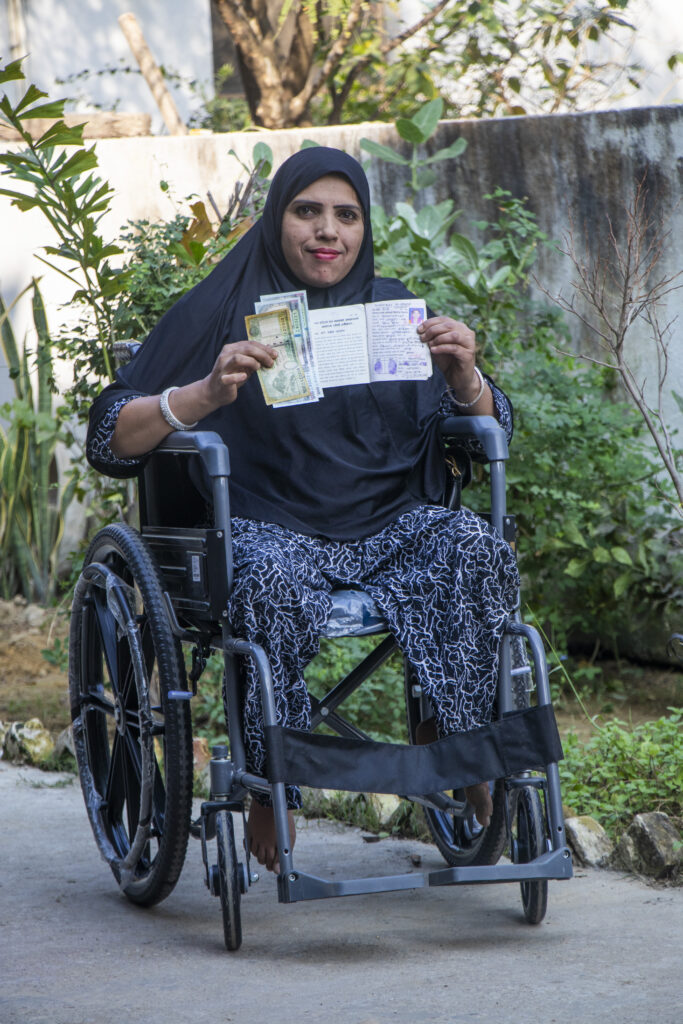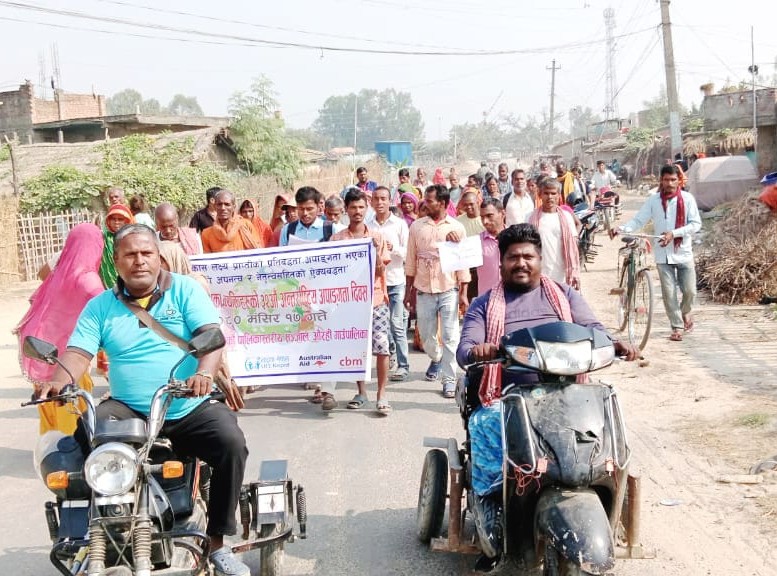- Celebrating 12 Years
Inclusive Climate-Resilient Community Development (IRDCN-P00147)
- 350310.12
- To contribute to building inclusive and resilient communities.
LIFE Nepal is implementing the project “Inclusive Climate Resilient Community Development in Nepal (IRDCN-P00147),” under the thematic area of Community-Based Inclusive Development (CBID). The project, running from July 2022 to December 2025, is supported technically, programmatically, financially, and administratively by Australian Aid and CBM Global, in partnership with the Disabled Society Janakpur (DSJ) as a co-partner OPD. The initiative contributes significantly to advancing several United Nations Sustainable Development Goals (SDGs), including SDG 1: No Poverty, SDG 2: Zero Hunger, SDG 3: Good Health and Well-being, SDG 4: Quality Education, SDG 5: Gender Equality, SDG 8: Decent Work and Economic Growth, SDG 10: Reduced Inequality, SDG 13: Climate Action, and SDG 16: Peace, Justice, and Strong Institutions.



Access
Lorem ipsum dolor sit amet, consectetur adipiscing elit. Ut elit tellus, luctus nec ullamcorper mattis, pulvinar dapibus leo. Suspendisse at magna suscipit, facilisis mauris et, ullamcorper elit. Nam efficitur ante quis porta interdum. Phasellus sed porta elit.
Challenges
Lorem ipsum dolor sit amet, consectetur adipiscing elit. Ut elit tellus, luctus nec ullamcorper mattis, pulvinar dapibus leo. Suspendisse at magna suscipit, facilisis mauris et, ullamcorper elit. Nam efficitur ante quis porta interdum. Phasellus sed porta elit.
- Lorem ipsum dolor sit amet, consec
- Nam efficitur ante quis porta interdum
- Suspendisse at magna suscipit
- Lorem ipsum dolor sit amet, consec
- Lorem ipsum dolor sit amet, consec
- Nam efficitur ante quis porta interdum
- Suspendisse at magna suscipit
- Lorem ipsum dolor sit amet, consec
a. Strengthened Disability Rights and Advocacy:
A total of 1,260 individuals (including 845 SHG members, 354 family members/guardians, 36 ward chairs, 25 ward members, and OPD members) were oriented on CRPD, legal provisions, vital registrations, advocacy, climate change, and local concerns. In addition, 1,136 individuals directly engaged in orientation and awareness events. SHGs conducted regular monthly meetings, submitted demand letters, and successfully influenced 10 out of 41 wards to allocate budgets for disability-inclusive development. All 41 wards committed to inclusive budgeting in the coming fiscal year.
b. Formation of SHG Networks and Inclusive Governance:
48 Self-Help Groups (SHGs) across Janakpurdham, Mithilabihari, and Aurahi discussed rights issues and presented them during local planning. SHG networks were established in Mithila Bihari and Aurahi, advocating for inclusive participation in local planning, accessible services, and livelihood opportunities. Municipal Project Advisory Committees (MPACs) were formed in three Palikas, committing to disability screening, ID card distribution, accessible infrastructure, inclusive health/education/agriculture policies, and livelihood support.
c. Capacity Building of Inclusive Champions:
A total of 48 inclusive development champions (32 men and 16 women) received basic and refresher training. They issued a nine-point declaration and engaged in advocacy with ward chairs, focusing on ID cards, inclusive budgeting, representation in committees, and service provision.
d. Awareness Raising and Policy Commitments: More than 640 individuals (including elected representatives, youth, social leaders, FCHVs, mothers’ groups, and inclusive champions) were sensitized on disability rights and inclusive development. A Lobbying and Advocacy Guideline was finalized and disseminated to 401 participants (86 women with disabilities, 138 men with disabilities, 92 children with disabilities, and 85 parents). As a result, several wards committed to inclusive planning and budget allocations.
e. Inclusive Education Achievements:
– 18 students with disabilities enrolled in schools through campaigns and home visits.
– 56 economically marginalized children with disabilities received school materials, improving attendance and participation.
– 131 teachers and SMC members oriented on inclusive education, pledging to use dignified language, promote enrollment, advocate for accessible infrastructure, request scholarships, and implement disability-friendly pedagogy.
– 17 mothers’ groups, FCHVs, and traditional healers trained to promote ID cards, school enrollment, and inclusive education.
f. Inclusive Health Services:
– 91 health service providers and municipal representatives oriented on disability-inclusive health services, agreeing to maintain disability records, integrate awareness into routine programs, improve accessibility, and coordinate referrals.
– Accessibility audits conducted in 3 health posts and 2 municipal offices led to structural changes such as ramps and toilets.
g. Assistive Devices and Accessibility:
Following screenings, wheelchairs (9), tricycles (4), walkers (3), crutches (3), and white canes (3) were distributed. In 2024, 10 mobility devices were provided as per technical recommendations. Accessibility audits led to infrastructure improvements in schools, ward offices, health posts, and municipal buildings, including ramps, tactile tiles, and water facilities.
h. Livelihood and Economic Empowerment:
– 71 beneficiaries supported with fertilizers and seeds; 120 beneficiaries supported with paddy crops.
– 36 beneficiaries piloted climate-adaptive agriculture (e.g., tunnel farming, drip irrigation, disease-resistant seeds), generating early income.
– 14 SHG members received vocational training in tailoring, computer skills, Mithila art, electrician, and repair trades.
– 103 individuals supported to establish micro-enterprises (e.g., grocery, tailoring, livestock, snacks, electronics, repair shops). Daily incomes of NPR 300–700 were reported, boosting self-reliance and household resilience.
i. Community Awareness and Inclusion:
– Information boards were erected at 10 public places, and IEC materials (pamphlets, brochures, flex banners) disseminated to promote disability rights and inclusive participation.
– A disability mapping database of 1,160 Persons with Disabilities (727 men, 433 women) was created at the municipality level.
– On International Day of Persons with Disabilities, more than 550 participants (community members, PWDs, government representatives) engaged in advocacy and solidarity events.
j. Policy Influence and Local Government Commitments:
– 299 local government representatives oriented on inclusive governance, committing to disability-inclusive budgeting, policy-making, and participation.
– Municipalities pledged to endorse guidelines for disability ID card distribution, develop inclusive disaster and climate resilience plans, and adopt universal design in new infrastructure.
– Specific wards (e.g., Janakpurdham Ward 9) announced immediate budget allocations up to NPR 100,000 for disability-inclusive programs.
A total of 1,260 individuals (including 845 SHG members, 354 family members/guardians, 36 ward chairs, 25 ward members, and OPD members) were oriented on CRPD, legal provisions, vital registrations, advocacy, climate change, and local concerns. In addition, 1,136 individuals directly engaged in orientation and awareness events. SHGs conducted regular monthly meetings, submitted demand letters, and successfully influenced 10 out of 41 wards to allocate budgets for disability-inclusive development. All 41 wards committed to inclusive budgeting in the coming fiscal year.
b. Formation of SHG Networks and Inclusive Governance:
48 Self-Help Groups (SHGs) across Janakpurdham, Mithilabihari, and Aurahi discussed rights issues and presented them during local planning. SHG networks were established in Mithila Bihari and Aurahi, advocating for inclusive participation in local planning, accessible services, and livelihood opportunities. Municipal Project Advisory Committees (MPACs) were formed in three Palikas, committing to disability screening, ID card distribution, accessible infrastructure, inclusive health/education/agriculture policies, and livelihood support.
c. Capacity Building of Inclusive Champions:
A total of 48 inclusive development champions (32 men and 16 women) received basic and refresher training. They issued a nine-point declaration and engaged in advocacy with ward chairs, focusing on ID cards, inclusive budgeting, representation in committees, and service provision.
d. Awareness Raising and Policy Commitments: More than 640 individuals (including elected representatives, youth, social leaders, FCHVs, mothers’ groups, and inclusive champions) were sensitized on disability rights and inclusive development. A Lobbying and Advocacy Guideline was finalized and disseminated to 401 participants (86 women with disabilities, 138 men with disabilities, 92 children with disabilities, and 85 parents). As a result, several wards committed to inclusive planning and budget allocations.
e. Inclusive Education Achievements:
– 18 students with disabilities enrolled in schools through campaigns and home visits.
– 56 economically marginalized children with disabilities received school materials, improving attendance and participation.
– 131 teachers and SMC members oriented on inclusive education, pledging to use dignified language, promote enrollment, advocate for accessible infrastructure, request scholarships, and implement disability-friendly pedagogy.
– 17 mothers’ groups, FCHVs, and traditional healers trained to promote ID cards, school enrollment, and inclusive education.
f. Inclusive Health Services:
– 91 health service providers and municipal representatives oriented on disability-inclusive health services, agreeing to maintain disability records, integrate awareness into routine programs, improve accessibility, and coordinate referrals.
– Accessibility audits conducted in 3 health posts and 2 municipal offices led to structural changes such as ramps and toilets.
g. Assistive Devices and Accessibility:
Following screenings, wheelchairs (9), tricycles (4), walkers (3), crutches (3), and white canes (3) were distributed. In 2024, 10 mobility devices were provided as per technical recommendations. Accessibility audits led to infrastructure improvements in schools, ward offices, health posts, and municipal buildings, including ramps, tactile tiles, and water facilities.
h. Livelihood and Economic Empowerment:
– 71 beneficiaries supported with fertilizers and seeds; 120 beneficiaries supported with paddy crops.
– 36 beneficiaries piloted climate-adaptive agriculture (e.g., tunnel farming, drip irrigation, disease-resistant seeds), generating early income.
– 14 SHG members received vocational training in tailoring, computer skills, Mithila art, electrician, and repair trades.
– 103 individuals supported to establish micro-enterprises (e.g., grocery, tailoring, livestock, snacks, electronics, repair shops). Daily incomes of NPR 300–700 were reported, boosting self-reliance and household resilience.
i. Community Awareness and Inclusion:
– Information boards were erected at 10 public places, and IEC materials (pamphlets, brochures, flex banners) disseminated to promote disability rights and inclusive participation.
– A disability mapping database of 1,160 Persons with Disabilities (727 men, 433 women) was created at the municipality level.
– On International Day of Persons with Disabilities, more than 550 participants (community members, PWDs, government representatives) engaged in advocacy and solidarity events.
j. Policy Influence and Local Government Commitments:
– 299 local government representatives oriented on inclusive governance, committing to disability-inclusive budgeting, policy-making, and participation.
– Municipalities pledged to endorse guidelines for disability ID card distribution, develop inclusive disaster and climate resilience plans, and adopt universal design in new infrastructure.
– Specific wards (e.g., Janakpurdham Ward 9) announced immediate budget allocations up to NPR 100,000 for disability-inclusive programs.
Project Area:
Three Palikas i.e., Janakpur sub-metropolitan city, Mithila Bihari, and Aurahi of Dhanusha district in Madhesh Province, Nepal
Target Group
Local Government, Persons with Disabilities, SHG, OPD
Programme Duration:
July 2022- December 2025
Related Programs
Global Girls’ Creating Change
August 17, 2024
No Comments
Empowered women prosperous Nepal
June 15, 2024
No Comments
Become An Volunteer For Save People
To drop us a line and keep in touch Contact LIFE Nepal team.
